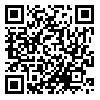BibTeX | RIS | EndNote | Medlars | ProCite | Reference Manager | RefWorks
Send citation to:
URL: http://journal.bums.ac.ir/article-1-2075-en.html

 , Ebrahim Akbarzadeh2
, Ebrahim Akbarzadeh2 
 , Yahya Mohammadi3
, Yahya Mohammadi3 
 , Mohammadali Nemati4
, Mohammadali Nemati4 
 , Mohammadreza Raeisoon *5
, Mohammadreza Raeisoon *5 

2- Department of Emergency Medicine, Faculty of Medicine, Yazd University of Medical Sciences, Yazd, Iran.
3- EDC, Birjand University of Medical Sciences, Birjand, Iran & Department of Curriculum Development, Faculty of Psychology and Educational Sciences, Allameh Tabatabaei University, Tehran, Iran.
4- Department of Educational Sciences, Faculty of Psychology and Educational Sciences, Allameh Tabatabei University, Tehran, Iran.
5- Social Determinants of Health Research Center, Department of Social Medicine, Faculty of Medicine, Birjand University of Medical Sciences, Birjand, Iran & PhD Student of Higher Education Management, Allameh Tabatabei University, Tehran, Iran. ,
Background and Aim: Intelligence quotient (IQ), cultural intelligence, and self-monitoring are among important and influential parameters in learning-teaching process of students. Thus, the current study examined the relationship between these parameters in the students of Birjand University of Medical Science.
Materials and Methods: The present study was a descriptive-analytic, cross-sectional type. The study population included all the students at Birjand University of Medical Sciences, selected through stratified randomized sampling method. In order to study IQ, cultural intelligence, and self-monitoring parameters R & B Cattell scale (Scale III), Erli’s Cultural Intelligence Inventory, and Snyder’s Self-monitoring Test were applied, respectively. The obtained data was fed into SPSS (V:21) software using Pearson correlation test, ANOVA, and t-test at the significant level of P≤0.05.
Results: From a total of 171 subjects participating in the study, 53.2% were female. The average age of the participants was 21.3±2.7 years. The average IQ, cultural intelligence, and self-monitoring scores were 106±10.44, 85.73±17.31, and 12.35±3.20, respectively. There was a significant correlation between cultural intelligence and self-monitoring (P<0.000; r=0/37). However, there were no significant associations between cultural intelligence and IQ scores as well as between self-monitoring and IQ scores.
Conclusion: Regarding the unfavorable cultural intelligence’ skills and abilities ;and their acquirable nature, it is suggested that University consider a significant position for educational and cultural programs in order to enhance cultural intelligence.
Received: 2016/03/3 | Accepted: 2016/09/17 | ePublished: 2016/11/15
| Rights and permissions | |
 |
This work is licensed under a Creative Commons Attribution-NonCommercial 4.0 International License. |



